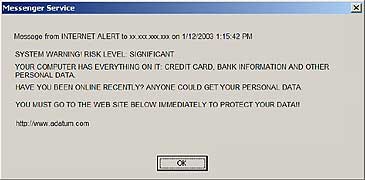This page, targeted towards home users, discusses the basic steps needed from an user to stop pop-ups. Part of the information in this page was collected from online sources, including the Microsoft Web site. Thanks and all credit due to the third-party sites referenced, and the authors for their part.
Pop-ups can be classified as follows:
- General browser pop-ups
- Messenger Service advertisements
- Pop-ups generated by adware and spyware
General browser pop-ups
These pop-ups can be prevented by installing a pop-up blocker. Often times, these new windows display advertising that can interfere with your ability to see the content on the page you're trying to read. Adding the Ad related Domains to the Restricted Zone in Internet Explorer is a good idea. Refer to the following MS-KB articles to learn how to stop pop-ups from a particular webpage.
Prevent Pop-up Ad Windows When Browsing with Internet Explorer
A New Window Appears When You Visit Some Web Sites
Windows XP Service Pack 2 now includes a built-in Pop-up blocker. You can read more about this feature, in the following pages:
Block Pop-up Windows with Internet Explorer: Windows XP SP2
Export Internet Explorer Pop-up blocker settings
Always allow Pop-ups for secure sites (HTTPS) in Windows XP SP2
Messenger Service Advertisements

The HIGHLY RECOMMENDED method to prevent these type of pop-up and to harden the security of your computer is to install a firewall application (such as Zone Alarm), or use the Windows XP Firewall. Windows XP SP2 turns off the Messenger Service by default, and enables the Windows firewall. This blocks the ports required for Messenger Service data transmission.
To enable the Firewall in Windows XP
For Windows XP SP2 systems:
If you're using Windows XP, and haven't updated to SP2, please do it immediately.
Click Start, Run and type Firewall.cpl
Select On (recommended) button, and click OK.
Never connect to internet without enabling the Firewall. Otherwise, there are fairly good chances your system gets infected. Finest example is the RPC NT Authority Shutdown caused by Blaster Worm, which infects "unpatched" and "unprotected" computers.
Note: If using a third-party firewall application, you don't have to enable the built-in Windows XP firewall.
References
Messenger Service Window That Contains an Internet Advertisement Appears
Stopping Advertisements with Messenger Service Titles
Pop-ups generated by Ad-ware & Spyware
Spyware cause the same effect as general browser pop-ups but they are usually powered by Browser Helper Objects, ActiveX controls which attaches to Internet Explorer and contacts their servers without your knowledge. This not only means waste of internet bandwidth, but your private information may also be sent to someone. You need to treat any outgoing connection without your permission, as a security threat.
Along with your anti-virus software, you need to anti-spyware tools such as Ad-Aware, Spybot Search & Destroy, Spyware Blaster at a bare minimum. You must update the pattern files before scanning just like what you do for your anti-virus software.
Protection mechanisms
Use HOSTS file to block unwanted ad servers and sites that are known to spread malware
Increase your browser security settings. Visit the following link to learn how to protect the system from parasites.
Dealing with Unwanted Spyware, Parasites, Toolbars and Search Engines
(Site packed with full of security tips, advice to prevent parasites being installed)
Use an application-based firewall, such as Zone Alarm, Sygate etc. They alert you whenever an outgoing traffic by a new application is detected. By doing this, you are preventing dialers, Trojans accessing the internet. Give equal importance to the configuration of the firewall. Assume your firewall as the gatekeeper, and only allow programs that you want, to access the internet. You may then test the effectiveness of the Firewall (for inbound protection) using any of these websites. They scan your system for open ports and vulnerabilities and advice you what action to take.












































Here are some rules for commenting on www.ShaanAli.info :
1,All comments except spams are welcome .
2,If you want to make a request ,please use English .
3,Do not use names such as Admin or Mod for commenting because it make others misunderstand .
That's all .Thanks for commenting .
4,Drop your comments Complaints Required Question In the Comments Box we Will reply you with in 24 hours